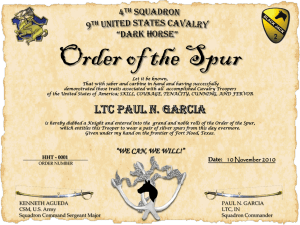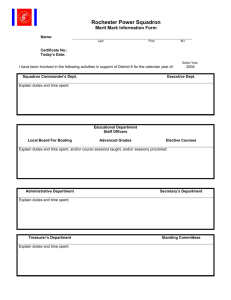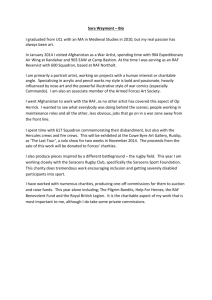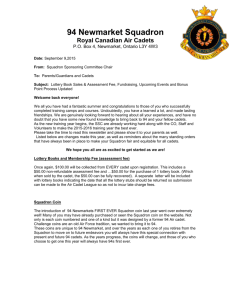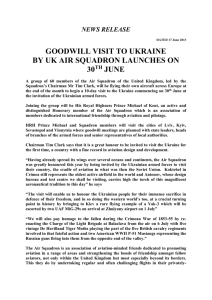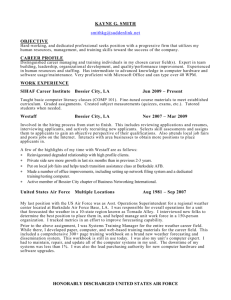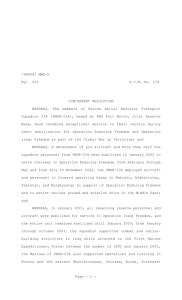Supply Officer's Duties
advertisement
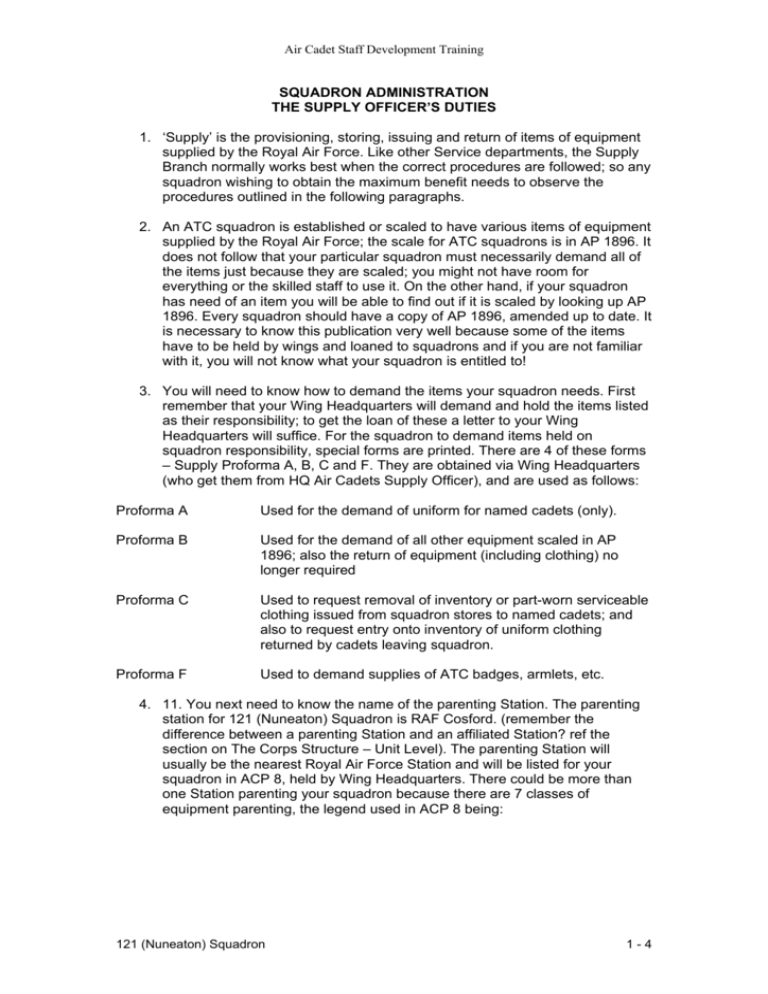
Air Cadet Staff Development Training SQUADRON ADMINISTRATION THE SUPPLY OFFICER’S DUTIES 1. ‘Supply’ is the provisioning, storing, issuing and return of items of equipment supplied by the Royal Air Force. Like other Service departments, the Supply Branch normally works best when the correct procedures are followed; so any squadron wishing to obtain the maximum benefit needs to observe the procedures outlined in the following paragraphs. 2. An ATC squadron is established or scaled to have various items of equipment supplied by the Royal Air Force; the scale for ATC squadrons is in AP 1896. It does not follow that your particular squadron must necessarily demand all of the items just because they are scaled; you might not have room for everything or the skilled staff to use it. On the other hand, if your squadron has need of an item you will be able to find out if it is scaled by looking up AP 1896. Every squadron should have a copy of AP 1896, amended up to date. It is necessary to know this publication very well because some of the items have to be held by wings and loaned to squadrons and if you are not familiar with it, you will not know what your squadron is entitled to! 3. You will need to know how to demand the items your squadron needs. First remember that your Wing Headquarters will demand and hold the items listed as their responsibility; to get the loan of these a letter to your Wing Headquarters will suffice. For the squadron to demand items held on squadron responsibility, special forms are printed. There are 4 of these forms – Supply Proforma A, B, C and F. They are obtained via Wing Headquarters (who get them from HQ Air Cadets Supply Officer), and are used as follows: Proforma A Used for the demand of uniform for named cadets (only). Proforma B Used for the demand of all other equipment scaled in AP 1896; also the return of equipment (including clothing) no longer required Proforma C Used to request removal of inventory or part-worn serviceable clothing issued from squadron stores to named cadets; and also to request entry onto inventory of uniform clothing returned by cadets leaving squadron. Proforma F Used to demand supplies of ATC badges, armlets, etc. 4. 11. You next need to know the name of the parenting Station. The parenting station for 121 (Nuneaton) Squadron is RAF Cosford. (remember the difference between a parenting Station and an affiliated Station? ref the section on The Corps Structure – Unit Level). The parenting Station will usually be the nearest Royal Air Force Station and will be listed for your squadron in ACP 8, held by Wing Headquarters. There could be more than one Station parenting your squadron because there are 7 classes of equipment parenting, the legend used in ACP 8 being: 121 (Nuneaton) Squadron 1-4 Air Cadet Staff Development Training LEGEND MEANING NOTES E Supply - All Services The named RAF parenting Station covers all aspects of supply. E1 Supply – Domestic Furniture and clothing. E1(B) Supply – Domestic, Barrack stores only Furniture only. E1(U) Supply – Domestic, except Barrack stores Supply – Technical Clothing only. E2 All items other than the domestic items listed for E1. E3 Supply – Accounting (for Supply Services) Some RAF Stations may not have the staff for these tasks and so a separate RAF parenting Station gives the service. E4 Supply – Ammunition Not all RAF Stations have armouries and so a second parent unit might have to be found for this service. 5. Having the right proforma and knowing the correct RAF parenting Station you can now make a demand; a. Supply Proforma B is used for Technical and Barrack items scaled in AP 1896; simply raise it in 2 copies, address it to the correct RAF parenting Station, detail the section, reference number, description and quantity taken from AP 1896 and send one copy off to your Wing Headquarters, who will record it and progress it for you. The parent unit will normally send small items of equipment by post, so make sure that Supply Proforma B has a postal address for small items and a delivery address for large items. The second copy of the proforma should be retained in your own file (see Correspondence). Supply of some items (e.g. rifles) is controlled, and in such cases the Proforma has to be sent by wing to HQ Air Cadets before it goes to the parenting Station; this is another reason why you send it to wing and not direct to the parenting Station. It may all take some time, so take paper action well in advance of the date you require the item. b. To arrange the return to parent unit of items of equipment (including clothing) no longer required, raise Proforma B as detailed in paragraph 5a above. 6. Procedures for uniform clothing (cadets) are more complicated, and Proforma A and C may be required. ATC squadrons are only entitled to stock part-worn serviceable (PWS) clothing as spares backing: a. When uniform clothing is required for an enrolled cadet and no PWS uniform is available in the squadron, a Proforma A is to be raised in 3 copies indicating parent Station, cadets’ names, item, reference 121 (Nuneaton) Squadron 2-4 Air Cadet Staff Development Training numbers, sizes and quantities of each garment. The original and duplicate Proforma A are to be sent to the parent unit or RFCA; the third copy should be retained on file. b. When a cadet can be supplied with PWS clothing from squadron stock a Supply Proforma C should be raised in 3 copies, 2 copies to be forwarded to the parent unit for inventory action, remaining copy to be retained on file. At the time of a cadet receiving his uniform clothing, by either system, he must sign for it on a Loan Card F668 or RAF Form 3518 (there is a special section for uniform issues on the back of F3518). c. If a cadet leaves the squadron it is very important that he should return all the items that he holds on his loan card. Items of clothing thus returned which are considered re-usable for future cadets are to be entered on Supply Proforma C (3 copies) ad 2 copies sent to parent unit for inventory action, third copy retained on file. The unserviceable, not-required items should be returned on Proforma B as detailed in para 5b. When measuring a cadet for uniform you will need to have something of the skill of a tailor, but, provided that you do not measure skin-tight and allow a little for movement, careful use of Supply Proforma A should achieve a reasonably fitting uniform. 7. You also need a basic knowledge of inventories (Articles in Use). The majority of items of equipment are now supplied and accounted for through a computer system known as the ICL 4/72, consequently a large proportion of an inventory will be in the form of a computer print-out. Certain items are not placed on computer base, these are; part-worn serviceable clothing which is held for re-kitting of cadets, items of office machinery, i.e. typewriters, printing and photocopying machines, etc; these are accounted for on manually prepared Forms 37 (Articles in Use) and therefore most ATC squadron inventories will consist of 2 parts. The parenting units allot at least one inventory to each squadron, which is denoted by 3 alphabet letters, and the Squadron Commander nominates an Adult Warrant Officer or officer as inventory holder to be responsible for looking after it and the equipment listed therein. 8. All items of Service equipment have a storage classification which is indicated by one of 3 alphabet letters, these are P, L and C. These classifications indicate the accountability of equipment as follows: a. Class P and L are accountable items which remain on charge (Inventory) and cannot be replaced except on return to Supply. b. Class C are items which do not remain on charge when in use and may be replaced without return to Supply. Whenever items of Class P and L are issued from the parenting Supply to a squadron they are listed in the squadron’s inventory (except clothing issued for named cadets on Supply Proforma A). The inventory holder checks all items listed in his inventory periodically to make sure they have not been lost, damaged or become unserviceable; also periodically an independent officer 121 (Nuneaton) Squadron 3-4 Air Cadet Staff Development Training (i.e. not the holder) checks the inventory to make sure that everything listed is present and complete. The RAF parenting Station keeps a ledger of all the items in the inventory and of all alterations made, such as items issued or returned as no longer required by the squadron. Whenever the inventory is due to be checked it has to be passed to the parent unit for comparing with the master ledger and making up to date. When it comes back to the squadron it must be checked against the actual holdings in the squadron’s store, plus items held on loan cards (except uniform clothing held by cadets on personal loan). If there are any discrepancies i.e. the squadron does not have an item that is listed in the inventory, then the matter has to be investigated, first by checking with the parenting unit to ascertain whether the error is an administrative one, and then by holding an enquiry to find out what has happened to the item. 9. The inventory holder therefore has an important job and must make sure that he keeps all the paperwork that goes with his inventory. If he is wise he will pencil in all the changes that are made by his returns and receipt of new equipment, especially of uniforms, so that he knows at any time exactly what scaled items (AP 1896) he has on his charge. When an inventory holder has to hand-over the inventory to another holder they both check the physical presence of all the items, together with the loan card holdings and then they sign a special certificate to say that they have ‘Handed-Over’ and ‘Taken Over’ responsibility. When checking the number of uniform items by reference to the loan cards, it is also necessary to check the Attendance Register to ensure that cadets who hold uniforms have not left the squadron. Thus loan cards are quite important in inventory procedures. 10. One more aspect of Supply which you should know of concerns surplus and obsolete items of equipment. The Ministry of Defence has agreed that certain items which are no longer required by the Royal Air Force, but which may be of long-term interest or training value to the Air Training Corps, can be issued to the Corps. These may be still-valuable items and will need to be looked after by the squadron staff, but they are not accounted for by inventory action. Instead they go on a Manuscript Register of Surplus Equipment, which is a form made up locally as detailed at Annex B to Instruction No 401 in ACP 20B. Because these items are not scaled, it is not always possible for a squadron to be given an up-to-date list of what is available, although Annex A to Instruction No 401 gives general guidance. However, if a parachute, liferaft, life-saving waistcoat or similar training aid is required, the Squadron Supply Officer can ask for it in writing. He will not know the section and reference number of what he wants, so he describes it as best he can (visits to RAF Stations and visits to Supply sections when on camp may help acquaint Corps members with the terminology), and sends the letter to Wing Headquarters who will progress it with the parenting Station, if this Station holds the item, or with Headquarters Air Cadets if the parenting Station does not. When the squadron receives an item under this scheme, the Supply Officer enters details of it in his Manuscript Register of Surplus Equipment, which he holds with his normal inventory. As for normal demands, copies of letters should be kept in a squadron file so that a check can be kept of the items that have been requested. 121 (Nuneaton) Squadron 4-4
